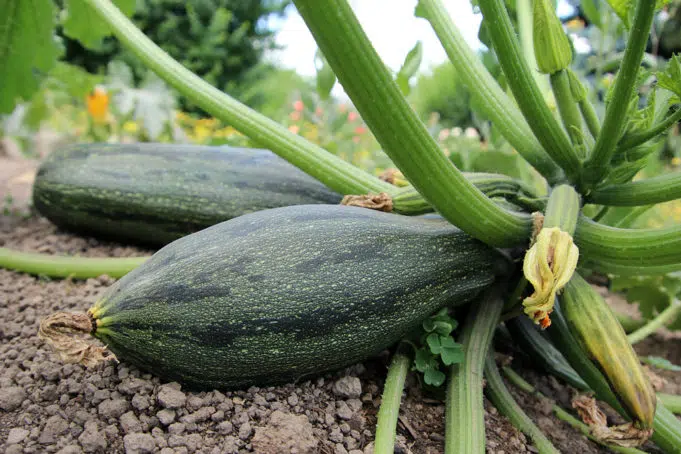Aromatic and popular. Zucchinis are one of the favorites in your own vegetable patch because of the numerous ways they can be prepared. Various dishes, from a zucchini salad to ratatouille, are feasible with the pumpkin plant. Since Cucurbita pepo var. giromontiina is a cucurbit, many wonder about possible poisoning if the fruiting vegetable is to be eaten raw. In this article you will learn whether zucchini is edible or poisonous raw.
Zucchini dangerous?
Is a zucchini edible raw? These questions are asked by many people who either grow the fruit vegetable themselves or want to eat it raw for a zucchini salad or other dishes. No direct answer can be given in a blanket manner, as possible toxicity depends on the ingredients.
Ingredients
- Cucurbitacins: Cucurbitacins are bitter substances, or more precisely triterpenes, which mostly occur as glycosides. The substances have a toxic effect on the human body and cause a variety of poisoning symptoms. Since they cannot even be destroyed by heat, raw and cooked zucchini containing the substances must not be eaten. Cucurbitacins can be found in large quantities.
- Vitamins: A great benefit to eating zucchini is the numerous vitamins. When you eat the fruiting vegetable raw, the vitamins are not destroyed. This is one of the reasons why the vegetable is so popular to eat uncooked. The vitamins it contains include B6, C, K and beta-carotenes.
- Minerals: In addition to vitamins, there are minerals. Compared to vitamins, these can be washed out during cooking, which reduces the content. In this case, eating them raw is a good option. Calcium, iron and magnesium are present.
- The dangerous substance in zucchini is cucurbitacins. Fortunately, these are not found in commercial zucchini, as they have been bred out of the plants for health reasons. These are the very specimens you can safely eat raw, as they are not dangerous or poisonous. Nevertheless, how does the vegetable cause poisoning? The next section elaborates on this point.
Note: In some cases, eating zucchini raw can cause allergic reactions that, depending on the intensity, can pose a great danger to the person affected. The reason for this is a cross-allergy to latex or the grape weeds (bot. ragweed), which occur in numerous people.
Toxic: Cucurbitacins
If you want to eat zucchini raw, you need to know whether it is a non-toxic cultivar or not. Since Cucurbita pepo var. giromontiina belongs to the cucurbits, the species naturally contains the toxin, which would make it impossible to eat. Over the centuries, people have cultivated the zucchini and thus bred the cucurbitacins out of the fruiting vegetable. This is the only reason why zucchini are edible at all and not poisonous. They can even be eaten raw without hesitation. Not edible, on the other hand, are zucchini that have undergone backcrossing for various reasons. This can happen due to the following causes.
Cultivation of homegrown seeds or pollination.
When it comes to zucchini, many gardeners come up with the idea of using seeds of specially grown specimens for further cultivation. However, one problem with this is the fact that in most cases the fruiting vegetables from these seeds will contain cucurbitacins. This problem arises when ornamental pumpkins are grown nearby. Ornamental pumpkins also contain high levels of the toxin and are therefore not suitable for consumption. However, Cucurbita pepo var. giromontiina can be pollinated by pollen from these species, resulting in the formation of the toxin. Therefore, always pay attention to the squash plants of the immediate vicinity.
Stress
When zucchini are cultivated in pots, stressful situations can occur that stimulate the formation of cucurbitans. These include:
- Transportation
- Temperature fluctuations
- exposure to intense heat
- long storage periods
As soon as the plant recovers, production is stopped again. This is only the case with zucchini plants from their own seeds. As long as you buy seeds from the store, you do not have to worry. Since these come from a controlled cultivation, no cucurbitacins will be found in the fruits. Nevertheless, pay attention to the following points by which poisonous specimens can be recognized:
- bitter taste
- rough skin
- resembles a pumpkin
Especially the bitter taste is a sign of the toxic substances. If you are not sure, carefully taste a tiny piece. If in doubt, discard the fruit.
Tip: If you have discovered bitter zucchini, you can easily dispose of it in the compost without worrying about the toxins. As the fruit rots, the cucurbitacins will pass away and the compost can be used.
Poisoning Symptoms
If a zucchini is not edible because of the cucurbitacins, you should expect symptoms of illness from eating it. Since the bitter compounds mainly affect the digestive system, more specifically the gastrointestinal tract, the majority of symptoms relate to this very area. Depending on the amount consumed, you may experience an intense reaction, which may even intensify. If you have consumed a bitter zucchino and one of the following symptoms is recognizable, one must assume poisoning:
- Nausea
- Vomiting
- Stomach cramps
- Intestinal cramps
- Diarrhea
- Damage to the intestine
- Damage to the stomach
- damage to the mucous membrane
- in the worst case death
Especially the damage to the stomach and intestines is dangerous, because depending on the amount, it can quickly lead to complications. For this reason it is important to see a doctor immediately after a suspicion. This is the only way to be on the safe side, because the toxins are definitely not to be trifled with.
Caution: Especially children, seniors and already weakened people, for example sick people, can develop severe symptoms of poisoning due to cucurbitacins. In this case, pay even more attention to the origin of the zucchini to exclude possible poisoning.


